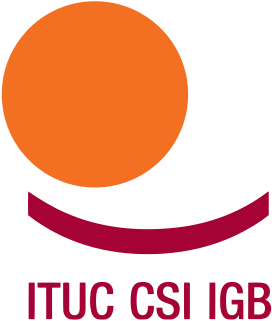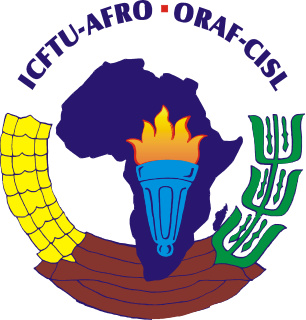Related Research Articles

The International Confederation of Free Trade Unions (ICFTU) was an international trade union. It came into being on 7 December 1949 following a split within the World Federation of Trade Unions (WFTU), and was dissolved on 31 October 2006 when it merged with the World Confederation of Labour (WCL) to form the International Trade Union Confederation (ITUC).

The World Confederation of Labour (WCL) was an international labour organization founded in 1920 and based in Europe. Totalitarian governments of the 1930s repressed the federation and imprisoned many of its leaders, limiting operations until the end of World War II. In 2006 it became part of the International Trade Union Confederation (ITUC), ending its existence as an independent organization.
Education International (EI) is a global union federation (GUF) of teachers' trade unions consisting of 401 member organizations in 172 countries and territories that represents over 30 million education personnel from pre-school through university. This makes it the world's largest sectoral global union federation.
The ITUC Regional Organisation for Asia and Pacific is a regional organisation of the International Trade Union Confederation representing trade unions from countries in Asia and Oceania. It has 40 affiliated organisations in 28 countries, claiming a membership of 30 million people.
The Union of the Independent Trade Unions of Albania (BSPSH), is a National Confederation of Trade unions in Albania. It was established in 1991 and held its first national conference in February, 1992. It has an estimated membership of 85,000.
The Confederation of Trade Unions (KSSh) is a National federation of Trade unions in Albania. It is a successor organization to the Trade Unions of Albania.
The General Centre of Independent and Free Unions of Angola (CGSILA) is a national trade union centre of Angola. With a membership of 50,000, it is led by Manuel Maria Difuila as President.

The Democratic Organization of African Workers' Trade Union was a regional organisation of the World Confederation of Labour. It has a membership of 35 unions and eight 'pan-African federations' in 29 countries.

The Hind Mazdoor Sabha is a national trade union centre in India.
The Moroccan Workers' Union (UMT) is the oldest national trade union center in Morocco. It was formed in 1955. With a membership of 306,000 the UMT represents workers in both the private and public sectors of the economy.

The International Trade Union Confederation is the world's largest trade union federation. It was formed on 1 November 2006 out of the merger of the International Confederation of Free Trade Unions (ICFTU) and the World Confederation of Labour (WCL). The Founding Congress of the ITUC was held in Vienna and was preceded by the dissolution congresses of both the ICFTU and the WCL. The ITUC has three main regional organizations: the Asia-Pacific Regional Organization, the American Regional Organization, and the African Regional Organization. The Trade Union Development Cooperation Network (TUDCN) is an initiative of the ITUC whose main objective is to bring the trade union perspective into international development policy debates and improve the coordination and effectiveness of trade union development cooperation activities.
Trade unions in Benin operate in relative freedom, with approximately 75% of the formal sector being unionized. There are, however, concerns expressed by the International Labour Organization (ILO) and the International Trade Union Confederation (ITUC) about the discrepancies between the government's Labour Code and the labour practices outlined by ILO Conventions 87 and 98 - specifically the right of unions to form without government approval, the right of seafarers to organize or strike, and restrictions on strikes.

The ICFTU African Regional Organisation (AFRO) was a regional organisation of the International Confederation of Free Trade Unions (ICFTU), representing trade unions from countries in Africa.

The ICFTU Asia and Pacific Regional Organisation (APRO) was a regional organisation of the International Confederation of Free Trade Unions (ICFTU), representing trade unions from countries in Asia and Oceania.

The ICFTU Inter American Regional Organisation of Workers was the regional organization of the International Confederation of Free Trade Unions (ICFTU) for the Americas.
Confédération africaine des syndicats libres, initially 'Confédération africaine des syndicats libres-Force ouvrière, was an Africa confederation of trade unions. CASL-FO was founded in February 1958 as the African sections of the French trade union centre CGT-Force Ouvrière separated themselves from their mother organization. The new union confederation was founded at a conference in Abidjan February 8–9, 1958, with participation of the CGT-FO branches of Senegal, French Soudan, Upper Volta, Niger, Ivory Coast, Cameroon, Moyen-Congo and Ubangui-Shari. At the time of the founding of CASL-FO, the relationship of the new structure with the International Confederation of Free Trade Unions (ICFTU) and CGT-FO, was debated. In the end the conference resolved that CASL-FO and CGT-FO should have membership of ICFTU on equal footing.

A member state of the Caribbean Community is a state that has been specified as a member state within the Treaty of Chaguaramas or any other Caribbean state that is in the opinion of the Conference, able and willing to exercise the rights and assume the obligations of membership in accordance with article 29 of the Treaty of Chaguaramas. Member states are designated as either More economically developed country (MDCs) or Less economically developed countries (LDCs). These designations are not intended to create disparity among member states. The Community was established by mainly English-speaking Caribbean countries, but has since become a multilingual organisation in practice with the addition of Dutch-speaking Suriname in 1995 and French-speaking Haiti in 2002. There are fifteen full members of the Caribbean Community, four of which are founding members.
The Plantation Workers International Federation was an international trade secretariat of the International Confederation of Free Trade Unions. PWIF was founded at the firth ICFTU world congress held in Tunis in July 1957. Samuel Powell Claret was appointed as the general secretary of PWIF and Tom S. Bavin as its Director of Organisation. PWIF was launched by ICFTU to organize plantation unions in the Third World.
The Liberian Federation of Trade Unions was a trade union centre in Liberia.
The International Federation of Petroleum and Chemical Workers (IFPCW) was a global union federation bringing together trade union representing workers in the chemical and oil industries.
References
- ICTUR; et al., eds. (2005). Trade Unions of the World (6th ed.). London, UK: John Harper Publishing. ISBN 0-9543811-5-7.
| This article related to a South American trade union is a stub. You can help Wikipedia by expanding it. |